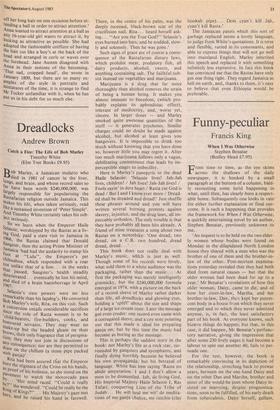Dreadlocks
Andrew Brown
Catch a Fire: The Life of Bob Marley Timothy White (Elm Tree Books £9.95)
Bob Marley, a Jamaican mulatto who died in 1981 of cancer in the liver, lungs, and brain, and whose record sales so
far have been worth $240,000,000, was
largely responsible for popularising the Rastafarian religion outside Jamaica. This
makes his life, when taken seriously, read like a sustained invention of 'Peter Simple'. And Timothy White certainly takes his sub- ject seriously.
So we learn when the Emperor Haile Selassie, worshipped by the Rastas as a liv- ing God, paid a state visit to Jamaica in Sangster, the Rastas claimed that Donald °angster, then the acting Prime Minister of Jamaica 'had had the audacity to stamp his foot at "Lulu", the Emperor's pet Chihuahua, which responded with a roar
not unlike that of a lion, in the weeks
that Passed, Sangster's health steadily deteriorated... eventually he lost his mind, and died of a brain haemhorrage in April 1967.
Selassie's own powers were no less remarkable than his lapdog's. He converted Rob Marley's wife, Rita, on this visit. Such a conversion entails considerable sacrifices since the role of Rasta women is to be :child-bearers, fire-builders, cooks, and honoured servants. They may wear no make-up but the beaded gleam on their Ltr°ws their only fragrance that of perspira- I"; they may not join in discussions of allY consequence; nor are they permitted to draw on the chillum (a stone pipe packed with ganja)', , Rita had been assured that the Emperor Dore the stigmata of the Cross on his hands, as proof of his holiness, so she stood on the r)avement to watch the motorcade pass bY,;;,. 'Her mind raced. "Could it really
she wondered. "Could he really be the hers, of Kings?" ... His Majesty's gaze met "ers, and he raised his hand in farewell. There, in the centre of his palm, was the deeply recessed, black-brown scar of the crucifixion nail. Rita ... heard herself ask- ing... "Are you the True God?" Selassie's eyes burned into hers, and he nodded, slow- ly and solemnly. Then he was gone.'
Such signs of grace are of course a conse- quence of the Rastafarian dietary laws, which prohibit meat, predatory fish, all dairy products, alcohol, sweets, and anything containing salt. The faithful sub- sist instead on vegetables and marijuana.
Marijuana is a drug that far more thoroughly than alcohol removes the strain of being a human being. It makes you almost immune to boredom, (which pro- bably explains its aphrodisiac effect), tolerant of mediocrity, and, worse yet, sincere. In larger doses — and Marley smoked quite awesome quantities of the stuff — it generates psychoses. Similar charges could no doubt be made against alcohol, but alcohol at least gives you hangovers. It is impossible to drink too much without knowing that you have done so, however little you may regret it. After too much marijuana follows only a vague, debilitating contentment that leads by im- perceptible stages to imbecility.
Here is Marley's panegyric to the dead Haile Selassie: 'Selassie lives! Jah-Jah lives, children! / Jah lives! Jah-Jah lives! / Fools sayin' in dere heart / Rasta yar God is dead / But l and I know ever more / Dread- ed shall be dreaded and dread!' Just shuffle these phrases around and you will have written several burning protests against slavery, injustice, and the drug laws, all im- peccably orthodox. The only trouble is that they have probably all been hits already. A friend of mine treasures a song about two Rastas on a motorbike: 'One dread, two dread, on a C.B. two hundred, dread dread, dread...'
This book does not really deal with Marley's music, which is just as well. Though some of his records were lovely, what sold them to a white audience was the packaging, rather than the music... At first the packaging was merely intelligently gimmicky, but the $240,000,000 formula emerged in 1974, with a picture on the back of a record sleeve of Marley rather darker than life, all dreadlocks and glowing eyes, holding a `spliff about the size and shape of a large ice-cream cone. Later the message got even cruder: one record even came with a corrugated sleeve, and a coy note pointing out that this made it ideal for preparing ganja on; but by this time the music had become as boring as the message.
This is perhaps the saddest story in the book: not Marley's life as a rock star, sur- rounded by gangsters and sycophants, and finally dying horribly because he believed his own propaganda, but his betrayal of language. White has him saying 'Rasta no abide amputation. I and .1 don't allow a mon to be dismantled. Jah, de living God, His Imperial Majesty Haile Selassie 1, Ras Tafari, conquering Lion of the Tribe of Judah ... He will heal me wit' de medita- tions of me ganja chalice, me cutchie (clay hookah pipe)... Dem cyan't kill Jah, cyan't kill Rasta.'
The Jamaican patois which this sort of garbage replaced seems a lovely language, to judge from White's quotations. It is terse and flexible, varied in its consonants, and able to express things that will not go well into mainland English. Marley inherited this speech and replaced it with something infinitely less expressive. In fact this book has convinced me that the Rastas have only got one thing right. They regard Jamaica as hell on earth, and, thanks to them, it's easy to believe that even Ethiopia would be preferable.






































 Previous page
Previous page